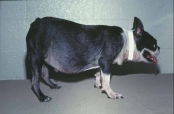Cushing?s syndrome, also called hyperadrenocorticism, is a disorder which results from the excess production of an adrenal hormone called cortisol. It is a common endocrine disease in middle-aged and older dogs. Miniature Poodles, Dachshunds, Boxers, Boston Terriers, and Beagles are particularly vulnerable.
What causes Cushing's syndrome in dogs?
There are three major causes for Cushing?s syndrome. The most common cause (85?90% of cases) is a small tumor in the pituitary gland. The pituitary tumor produces a hormone (adrenocorticotropic hormone or ACTH) that causes the adrenal gland to grow and oversecrete cortisol.
Less commonly (10?15% of cases), the adrenal glands themselves develop a tumor that secrete cortisol.
A third cause of Cushing's syndrome in dogs results from the long-term use of high doses of corticosteroid drugs such as prednisone or dexamethasone. These steroid drugs are used to decrease inflammation or treat an immune disorder.


What clinical signs do dogs with Cushing's syndrome develop?
Common clinical signs include the following:
* increased thirst and urination
* increased appetite
* excessive panting
* lethargy
* pot belly appearance
* weight gain
* hair loss
How do we diagnose Cushing's disease in dogs?
Diagnosing Cushing?s syndrome can be difficult. Laboratory test results may be inconclusive and dogs suffering from other diseases commonly show false-positive test results for Cushing?s syndrome. (For more information, see this post on my Vet Blog.)
Once we have diagnosed Cushing?s syndrome, the next step is to determine whether the disease stems from a tumor of the pituitary or of the adrenal. This can be done by further endocrine testing or by imaging techniques such as abdominal ultrasound.
How do we treat this problem?
Most dogs with hyperadrenocorticism can be treated with drugs such as mitotane (Lysodren? or trilostane (Vetoryl?). However, these drugs are most safe and effective when used under the supervision of a veterinarian with much experience their use.
If the dog has a tumor of the adrenal gland, surgical removal is generally the best option. Finally, external radiation therapy can help dogs with pituitary tumors, especially large ones.


Źródło: animalendocrine.blogspot.com
© 2024 © Vetco 2015. Wdrożenie: Pracownia Synergii










